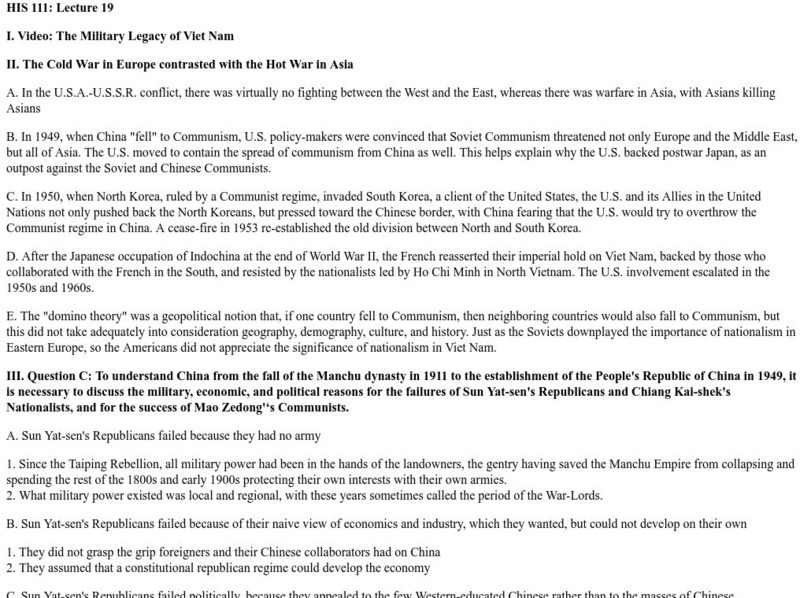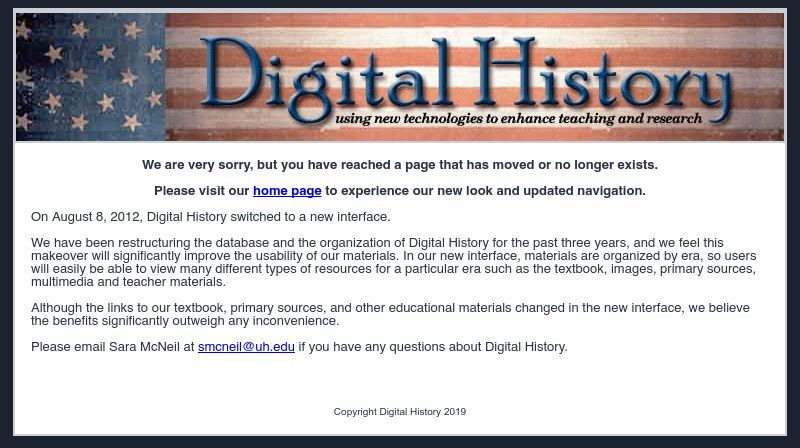Historical Thinking Matters
Spanish-American War: 3 Day Lesson
Why did the United States choose to invade Cuba in 1898? As part of a 3-day instructional activity, your young historians will first develop working hypotheses to answer this question, then work with a variety of historical primary...
Roy Rosenzweig Center for History and New Media
End of the Cold War
How significant was the Cold War during the 20th century? After reading and analyzing speeches by Ronald Reagan and Mikhail Gorbachev, learners consider the historical context of foreign policy decisions made during the Cold...
Curated OER
Introduction to China
Compare and contrast the distinctive characteristics of art forms from various cultural, historical, and social contexts, and describe how the same subject matter is represented differently in works of art across cultures and time...
Curated OER
The Crucible by Arthur Miller
Begin reading The Crucible and form a foundation for your study with this presentation. Arthur Miller and the historical background of McCarthyism are covered at the beginning, followed by short descriptions of all the characters in...
Curated OER
The Crucible by Arthur Miller
Examine the life of Arthur Miller and the characters in one of his well-known plays, The Crucible. The first few slides give background information on Miller as well as Senator McCarthy and the blacklisted celebrities during the...
National First Ladies' Library
Safety or Civil Liberty? The Trial of Sacco and Vanzet
Students investigate the Sacco-Vanzetti trial and develop a basic understanding of the issues involved. Then they write an essay taking a stance on the Sacco-Vanzetti trial: was the trial fair? were the two men falsely accused? Finally,...
Curated OER
American Foreign Policy Since World War II (The Cold War)
Young scholars identify and interpret some key figures and major events during the Cold War era, including the Korean War, Vietnam, Cuban Missile Crisis, Bay of Pigs Invasion, and the United States and China Cold War Relations. They...
Curated OER
Fall of Soviet Union/Rise of Chinese Communism
Ninth graders examine the reasons for the fall of communism in the Soviet Union and the rise of communism in China. They listen to a lecture and complete slot notes, listen to and read the lyrics to the song "We Didn't Start the Fire"...
Curated OER
Hitting the Cold War From All Angles
Eighth graders use maps, lecture and research to explore the history and social context of the Cold War. They examine films, music and important figures of the era.
Curated OER
H4 Homework Assignment #19-21
In this global studies worksheet, learners read the noted pages in their textbooks and then respond to 9 short answer questions about Communist China.
National First Ladies' Library
Red Hunts, Black Lists, and Communists
Students research and examine the unsavory history of the hunt for communists in the United States during the 1950s. They divide up into groups to review the Red Scare of the 1920s as a backdrop to the McCarthy era and write a short...
Curated OER
What is Communism?
Eleventh graders explore Communism. They explore Communism's roots in economics and discuss the spread of Communism in the Eastern Hemisphere. They evaluate a Communistic and a Capitalistic society. Students reflect upon the positives...
Curated OER
Governments of the World
Students examine how different world governments function and interact with each other. In groups, they research one of the five types of governments. Students prepare news magazines, Powerpoint presentations, and newspaper storyboards...
Curated OER
Communist Revolution
Students examine the Russian Communist Revolution of 1917. They watch and discuss a video, take notes and answer video discussion questions, and read and evaluate newspaper articles about how Lenin and Stalin are viewed today in the...
Curated OER
People Power
Students view a television program that explores many Eastern European residents' discontentment with communism. They work in groups to research living conditions in an Eastern European country before communism, under communism and...
Curated OER
Capitalism and Communism: What's the Difference?
Students discover the differences between capitalism and communism. They participate in a simulation activity in which they examine Marx's philosphy of communism. They also examine Zapatista communities.
Curated OER
Country: Korea
Students inspect Korea's geography, climate, history, and culture. They practice writing Korean numbers and review information about the Korean War and the division of the country into north and south. They label and color a map of South...
Curated OER
L I V I N G U N D E R C O M M U N I S M
Students examine a communist regime and what it means to live within a communist societyl.
Curated OER
The Soviet Choice For Growth
Students examine five major events in Soviet History to introduce the concept of opportunity cost. They identify considered alternatives at the time of decision and examine benefits and cost. They apply these ideas to a typical school day.
Curated OER
Rusyns Survive Time in Central & Eastern Europe
Tenth graders study the different ethnicities in Europe. In this Eastern Europe ESL lesson, 10th graders read an article and complete guided questions. Students participate in a debate.
Arizona State University
Arizona State University: Chinese Nationalists
This site from the Arizona State University offers information about the Chinese Nationalists who played a part in the history of China.
Digital History
Digital History: Cuba and the Bay of Pigs Invasion
In 1959, rebel leader Fidel Castro toppled Cuban dictator Fugencio Batista. In Washington, Castro told U.S. officials that "The [Cuban] movement is not a Communist movement. We have no intention of expropriating U.S. property, and any...
Vassar College
Vassar College: The Wars for Vietnam: The Documents
Document excerpts from the years 1954-1973 demonstrating U.S. support of South Vietnam. Includes links to other Vietnam sources.
US Department of State
U.s. Dept. Of State: Archive: Inf Treaty of 1987
Copy of the INF Treaty made by the US and the USSR in December of 1987.
























